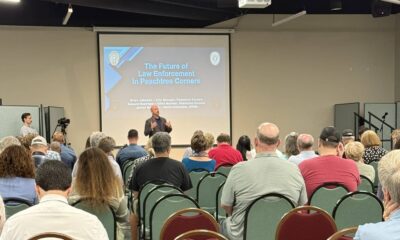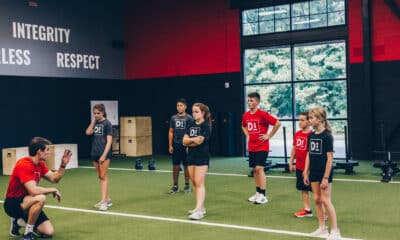Community
John Eaves, running for Congress, talking COVID19, the economy and more [Podcast]
Published
5 years agoon
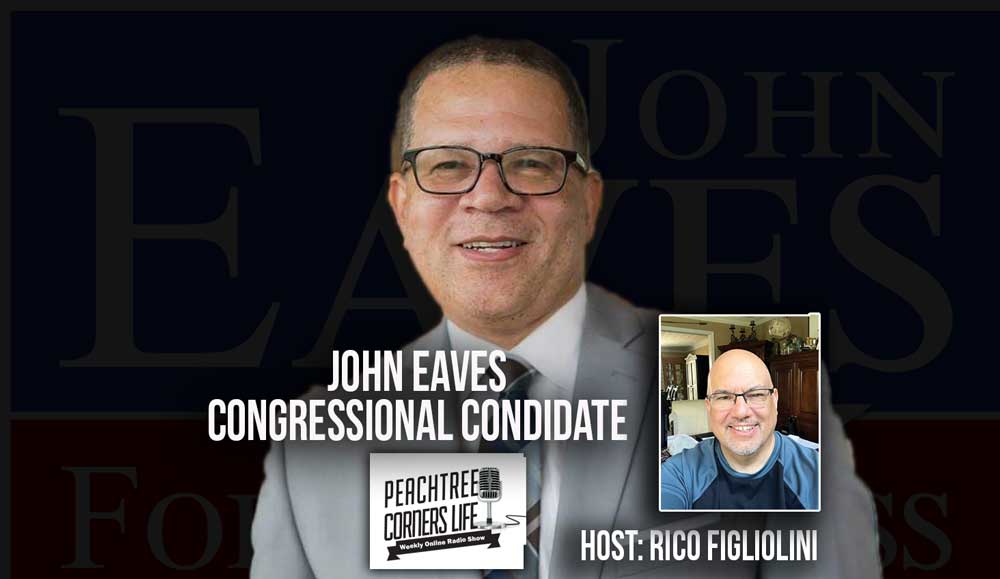
In this episode of Peachtree Corners Life, Rico Figliolini has a chat with Congressional Candidate John Eaves to talk about his campaign. Listen in as they discuss John’s views on Immigration, Health-care, Education, and dealing with COVID-19.
Resources:
https://eavesforcongress.com
“I think that the district that I want to represent is a very special district. District 7…is one of the most diverse districts, jurisdictions in the entire country. I think that we have a potential of being a model of how we do it. And I think that diversity is wonderful, but I’m also thinking it’s important for us to have what I consider, what I call it, inclusion. So how can everybody be at the table in terms of really supporting and benefiting from all the services that are present within district seven.”
John Eaves
Timestamp:
[00:00:30] – Intro
[00:01:56] – About John
[00:03:39] – Campaigning during COVID-19
[00:07:36] – Online Campaigning
[00:08:02] – How to react to COVID-19
[00:11:36] – Economic Changes
[00:16:16] – Issues Coming to the Forefront
[00:19:17] – Education and Jobs
[00:21:16] – Immigration
[00:25:21] – Medicare for All
[00:30:18] – Election Details
[00:32:58] – Closing
Podcast Transcription
Rico: [00:00:30] Hi, this is Rico Figliolini, host of Peachtree Corners Life. This is the Peachtree Corners Life show in the city of Peachtree Corners. I’m glad you can join us or if you’re viewing this on demand, that’s great too, and if you’re listening to this as a podcast on iHeartRadio, Spotify, or anything else, just leave us a review like that because we could go a little further up in those searches when you’re searching out for us. I have a special guest today. Before we get to him, I just want to say thank you to Hargray Fiber for being a sponsor of our family of podcasts. They’re a fiber company that works with a lot of businesses, small businesses and homes, but they are really involved in the small business community and midsize companies here in the city of Peachtree Corners and throughout the Southeast, actually providing fiber solutions to companies. And especially in this time, we’re COVID-19 and everything with dealing with people working from home and dealing with that, they’re doing a great outreach in our community to help everyone so you can find more information on them at HargrayFiber.com. Now let’s get to our guest, special guest tonight running for Congress. And if had one candidate before, he’s my second one to talk to to find out a little bit more about why he’s running for Congress. And this is John Eaves. Hey John.
John: [00:01:52] Hi Rico. Thank you so much for this wonderful opportunity to talk to you and your listening audience.
Rico: [00:01:56] Well, I appreciate you coming out to be able to do this, well coming out. We’re social media. We’re not quite on zoom, but I’m using something called switcher studio, which is letting us do all of this, and at a safe distance, I guess. So tell me, John with, what is it? Seven congressional candidates running in this race? And that’s just the democratic side. I can, this Republican. Yeah. Why do you want to do this? Tell them.
John: [00:02:27] Well, as you pointed out, it’s a, it’s a crowded field. It’s an open seat. The current Congressman in the office, the incumbent, is retiring. So there’s a lot of competition, a lot of people who want the position, but I think I’m pretty unique in that, number one, Rico, I want your listeners to know that service is just part of my DNA. I’ve been doing this, helping out people, a good part of my adult life. After I graduated from high school, went to Morehouse college. When I got to Morehouse, I rolled up my sleeves. I got in the community and doing that ever since got into political office 11 years ago as a chairman of Fulton County, after 11 years of service. I moved north to Gwinnett to live in Peachtree Corners and decided a year ago to run for Congress. And so to make a long story short, it’s about service, about leadership. It’s about making our communities better. And it’s about plotting for our future.
Rico: [00:03:24] Well, I’m glad you feel so good about it. I mean, you were born Floridian, born and raised in Florida. You moved to Jupiter in ‘95 you’ve, you’ve done a lot. I mean, you, you’ve been in the Peace Corps, I think, right?
John: [00:03:37] Yes, yes. Regional director, Peace Corps.
Rico: [00:03:39] And you’ve been chairman of the Fulton County board. So you feel the and all the things that you’ve done. I mean, that’s, I can go through a list. And you’re a poly PSI political science. The political junkie, just like, this is good. So, you know, I feel for you, there’s a lot of people running, and then normally this would be a tremendously hard race to run in a normal world. When you’re doing door to door, you’re doing meetings almost every night, maybe. Well that is gone now. How are you doing it now? How are you handling it in the, I can’t even say post COVID-19 world cause we’re still in it. So how are you handling that? How are you campaigning yet?
John: [00:04:30] Well Rico, that’s a fair question. I mean, you know, I used to love to play baseball and I was a great baseball player when I could hit the fastball. But when I got old enough and that curve ball started coming, it was hard for me to hit that one. And this is like a curveball. I mean it’s just a major adjustment and understandably so. People are struggling now trying to give, to come to grips with the new reality. Politics is not high on their priority. They’re worried about putting food on their table, whether the job is going to stay in place. The fact is, I’m in this race and you know, my asset is getting out there and knocking on doors and kissing babies and getting in front of people right now. I’ve got to transform and use the internet technology. Zoom, telephonic town hall meetings and use the virtual world to get my message out. That’s why this podcast is important because this is one of ways, many ways that I can get out and share my message and, and hopefully, for the voters to get a sense of my sincerity and my passion. So it’s, it’s tough. I mean, fundraising is challenging, particularly. I talked to a friend of mine last week who said, John, I’m going to stick to my promise to make a contribution to your campaign, but I lost a half a million dollars in the stock market. I have another friend who I talked to today and say she got furloughed. So it was very difficult for me to ask the potential donor or contribution when they’ve lost a lot of money in terms of their retirement savings or their day to day, and they didn’t. They live in, so it’s tough. You have to be sensitive. Well, you know, I just have to dig down deep and just keep plugging ahead.
Rico: [00:06:12] You know what’s interesting as you were saying that I’m thinking, I mean, I used to run, I used to be proud of campaigns in New York, in Brooklyn when I was younger. Did some stuff here early in late 1990s, early two thousands. Politics costs money. I mean, you, you have to spend the money in signage and all this stuff. Really it goes away. The only thing that doesn’t go away really is mailings. Maybe there are only two ways you can reach anyone is through a virtual world like zoom or the whole virtual world, right? Most of that doesn’t cost a lot of money to do in this room.
John: [00:06:47] Right.
Rico: [00:06:47] So at least that’s the saving grace, maybe.
John: [00:06:50] It is, it is. I saw the conventional wisdom marketing as well as running campaigns as you have to touch people so many times. And so that sort of, the magical number is seven times, believe it or not, you hit him with the, or you touch him with a mailer, you touch
him with a phone call, you touch him with a handshake. And after seven times, you remember the name. John, they remember the name Rico, right? But I think that yes, there’s a new reality that we have to adjust to. And so how can we really reach people through the virtual world? And it’s still this intimate and informative and personable. So to your point, there’s no cost to this. Which you also have to compete with. Everybody else is also using these platforms to get their message out.
Rico: [00:07:36] That’s right. So let’s get to that a little bit. Let’s talk a little bit about some of the things going on in this world. I mean, obviously, you know, president Trump who loves to do big mass meetings and convention centers, and he gets pumped up with that.He’s not doing it right. Biden is doing virtual town halls from Feinstein correctly, his basement in Maryland.
John: [00:08:01] In Delaware.
Rico: [00:08:02] In Delaware. There you go. And Bernie Sanders is the US Senator, so I mean, he has some availability there, although they’re changing the way they’re doing some of those things. So, you know, the economy’s changing for a lot of people. Not only politicians, obviously, but everyone else and I feel for them. I feel for the EMT, the fire, the police, but also feel for the grocer that has to pack the shelves with brand new paper, paper products. This morning at Ingles, by the way, went out, eight o’clock maybe six rolls, six packages of toilet paper and everything else was gone on those shelves. It’s a different world. How, how do you think Americans should react and behave in this, considering where we are right now, considering where Italy is right now, we’re China with, we’re with some of these other countries are like, especially with Italy, where it’s just so bad. There are so many hits in New York state with Governor Cuomo on the air every day. How can you know? What’s your perspective? What should we be doing? What can we think about where, where should we go, John?
John: [00:09:17] Great question, Rico. I think there’s several things we can do. Number one is what makes the United States unique? For me, having traveled around the world, whether it’s in Europe or Africa, South America or Asia, people often remark that what they like about Americans is sort of this spirit that we have in terms of looking out for our brothers and our sisters. And I think that now the tendency is to support our home, protect our own, but also think that we also have to do a two way street in terms of making sure that we can support our brothers and our sisters who are neighbors and even people who are outside of our neighborhood. So I think that’s sort of a spree decor in terms of helping others is one of the things that we must hold on to. But I think that over and beyond that is, I think it would be sort of an assessment of how we operate as Americans in this society. If any other crisis like this comes about, how can we make sure that our healthcare system is a lot more robust and responsive? Because the way I see it right now, there was a fractionalization of our health care delivery system, and that’s why it’s so challenging right now to get the resources that are needed to help people out right now. So I think there’s going to be a reevaluation of our, of our healthcare system. I also think there’s an opportunity for us to really critically look at our society and the great inequities that are present between the haves and the have nots.
You pointed out the people who are working in Ingles or Publix or Wendy’s or Chick-fil-A. In the meantime, those are people who don’t have any other means of living, so they have to work these low paying jobs. Whereas other folks in our society, in our community, where there’s Peachtree Corners or Lawrenceville, some of them may have professional jobs. You can work at home and are not necessarily in harm’s way. So I think the healthcare delivery system will be reassessed how it can be better and more equitable. And then just society in general. How can we minimize this wealth gap that we have in our society? Because I think it’s very clear that people who do not have the means who have to work, they’re potentially putting themselves in harmful situations.
Rico: [00:11:36] Well, they are, and I totally agree with you. I mean, it’s, you know, the cashier that has to check you out. The waste management people that have to pick up the garbage. I mean, that’s such a job, right? They can’t get six utility workers. I mean, they’re housing some of these utility workers on site pretty much, cause God forbid they get sick. The special ops jobs, right? They can’t do the job. Sounded like they could just hire someone on the street. God forbid they’d lose that. Where would the power go? You know, where would the water come from? So we’re not apocalyptic yet, thank goodness. Hopefully things will work out and this goes away, but the economy has changed, right?
John: [00:12:20] It has, it has, you know, so Congress passed a $2 trillion stimulus package last Friday, I believe, signed by the president. Some money will be coming down in terms of, I think a $1,200 or $1,500 check for adults who make under $75,000, I believe. And then households. And small businesses. But I believe that to a certain degree, that money is, even though it was, you need it for the economy. For the person who is poor, they need more than that. But a person who may be managing a small business that $10,000, maybe just a drop in the bucket of what’s needed. I’m not questioning anything that’s given, I think that something should be given, but I think that an every size fit all type approach may not necessarily be the best thing in terms of this big gap between those who have and those who do not have.
Rico: [00:13:26] I think that, you know, I mean obviously I think most of the work is a little the, the basics, right? $1,200 for 75,000 and under. $2,400 for a family, a married couple. It’s a couple $500 per kid. It’s one time payments. This thing looks like it’s going to go into May, not just April. It may be right. So I heard one Senator that said, listen, this is all we could do. Now most people want it. Most of the Senate wants to wait until the end of April to figure out, do we need to do this again? Right? Okay. The waiting piecemeal, it’s like they can’t even, they’re trying to put everything I know munition initially. Right? You wanted to put the dollars in your pocket as fast as possible. This is why it’s so basic and why our deployment is so basic to right. What kind of climate they’ll just plop on another $600 on top of it, and expand it. But is there more they can do, I mean, should they be doing something in addition to this, they’re going to ultimately pass more legislation that’s going to happen. They’re getting more thinking that it’s not as naive. We’re going to spend another couple of, or $3 trillion more after this shortly within the next 60 days, I bet. What do you think should be in the house?
John: [00:14:51] Well, I think you, the way you described it, I think it’s right. I have heard that the house right now is thinking about the next stimulus package. So that whenever we make it through this initial period, hopefully the house, because of some of the homework they’re doing right now, and ultimately the Senate would get on board. The next stimulus package will come. About in a lot more seamless way. I think it’s, I think in terms of the Coronavirus, we will know within the next two weeks how worse this thing is going to get. Well, what are the social distancing practices and that personal hygiene and the testing is going to lead to sort of a stabilization or flattening of the numbers. So I think the next two weeks are crucial in terms of how long this thing will persist and what the continued impact will be on the economy. So hopefully they are discussing negotiating, crafting ups with some sort of next step, next phase, stimulus that will come in place. Maybe as early as May or June. So that this initial outlay that goes will carry us at least for the next few months.
Rico: [00:16:16] The world has changed, right? They’re going to be changing the way we’re working. You can tell working is changing, right? The way most people are working from home now, I think there are companies that are figuring out at this point, wow, we don’t need these big offices. We can really do this work from home with Zoom and all these, well, the rest of the technology. I know my local boss at a small paper, he’s like, we don’t need that 2000 square foot office. We could go get a small office. Everyone can be working from home, right? The world is changing that way. We’re going from the gig economy. We’re doing this now. So how do some of these other issues that you’re, that’s near and dear to your heart? Like immigration, like I’m halfway to citizenship. Education. Maybe daycare for all, Medicare for all. I know there was a segment may, well Italy had Medicare for all and see what happened. I think once it’s apples to oranges when you’re talking, when someone talks. What issues do you see coming to the forefront in this type of world that you would like to attend to and your positions on those?
John: [00:17:29] You know, I don’t want to sound like a broken record, but I think, I think the thing that really struck me most about this is, and I’m an educator, but how folks who are struggling paycheck to paycheck. Their lives tremendously impacted as a result of this virus and the impact on the jobs that they have. And I believe that the American society will benefit better or best when there is more parity in terms of income distribution in our society. And I think that there’s gotta be some series of strategies that are going on right? The ship in terms of this imbalance, whether it’s in the more robust public education system, whether it is, pay wages, minimum pay wages, or raising up the minimum wage, or whether it’s job readiness training and more specialized areas that are better paying than they currently are. And you mentioned about how the workforce or the workplace may change. I think that there will be a more of a demand for specialized skills. And how can we diversify that workforce, so that people who are right now, perhaps the lot, the bottom third, can have those skills to be able to have middle class jobs. So I think that there will be a forcing of how can we stabilize the bottom third or the bottom two thirds of our society so that it can be a lot more equitable than it is right now.
Rico: [00:19:17] Yeah, I think I agree with you. I think education has to be certainly a big part of that. Whether it’s college free. Although not everyone needs college, right? Some of the stuff that, that’s in need, electricians, plumbers, Hvac, people that work power plants and such. Some of it’s just certification. Some of it’s good, just knowledge, right? Apprenticeship was big in Europe and Germany. And I’m beginning to see some of that here, beginning to see, what used to be called the vocational high school when I was younger. They’re not calling that anymore. They’re calling it may be blended education or a different way of a different phrase, but it’s all the same thing right. It’s teaching a kid coming out of high school to be able to do a job. Do you, do you see more of that?
John: [00:20:12] Rico without question. So you mentioned about German education. So I’ve visited Germany several times, and they, so they have, I think it’s called Polytechnic institutes. I’ve been to Finland and technical training is a lot more sexier in many parts of Europe than it is over here. There’s a stigma attached to vocational or technical training, right? The reality is these individuals who are trained have a skill and they’re paid very well. I’m a college professor. I love a college education, university education, but you can also have an alternative type of education that is the training of the hands, and I think that it has to be more of an acceptance, more of a celebration of those people who go to that track because they too are valuable people in our societies. So I think that, whatever you call it, absent of vocational, which may have had a negative stigma, we have to really begin to think in terms of how we can provide a better and more specialized workforce.
Rico: [00:21:16] Right. Yeah, I totally agree with you there. There are high paying jobs in many of them too. They just need the skill to be able to attend to them. What about immigration? What about the 12 million plus illegal immigrants or undocumented immigrants that are in the United States? I’m firstborn American generation in my family. My parents came from Italy. They were sponsored. He had a job when he came here. Not much money, a few dollars in his pocket, but at least he had a job and a place to stay. And he worked his way up. So what do you think about the, you know, and there and the immigrant population here? Not only, well, they are hidden in a way. And I prayed vice possibly, and that with COVID-19, having to deal with that. Where do you think that should, do you think that should change where we are right now?
John: [00:22:15] I do. So like you, I’m a product of the immigrant community. My grandfather immigrated here from Jamaica in 1913. He was an honorable man, hardworking man, and raised 13 children. Most of them went to college. And so I have a passion and I have a sensitivity towards the immigration or the immigrant community. My grandfather, he lived here. He lived to be 99 years old.
Rico: [00:22:39] Wow, God bless him.
John: [00:22:39] He was not officially an American system citizen. He was undocumented. But it’s still, Oh yeah. He came, he went to Panama, came to New York city, ultimately ended up in Jacksonville, Florida was not American citizen, but he was the most honorable man that I’ve
ever met and law abiding and a contributor to society. And so I believe that the 12 million or so that are here, who are undocumented, there should be a path towards citizenship. I think that they are already working well, contributing to society, paying taxes, working jobs, albeit maybe jobs as landscapers or working in people’s homes. Well, why not provide a pathway to citizenship for all immigrants who are coming in, in the future? Let’s be fair. People from Europe coming in freely and being reluctant about people who are coming from central America. I think we have to be consistent. We are a society or a country of immigrants, and so I think we need to be fair, consistent. I do think that there may be some sort of criteria so that there is a process. Well, let’s be sure. Let’s make sure we’re fair and consistent.
Rico: [00:23:57] Would you think of a process where, for sure the children of undocumented documented immigrants could become US citizens, whereas the parents that may be undocumented become permanent residents. I mean, there’s a difference, right?
John: [00:24:14] Yeah. There, there is a difference. So, I was in office when president Obama was president and came up with the dreamers act or the dreamers position. In terms of protecting those who are born here. And I’m supportive of that. I think that legislation or that policy sort of caught up in the court system right now, but I think that, the children who are, the products of those one documented should have a special status because they actually were born here in the United States.
Rico: [00:24:47] Yeah. You do respect them, because there’ll be people asking, I’m sure you do respect borders. You do believe that we, America should have borders and they should be strong borders too. Every sovereign nation has that link.
John: [00:25:01] I agree. I don’t think that we need to have a big wall to, you know, cross the Southern border. I’m just sort of philosophically against that because I think that the intention behind the current administration is more, it’s more negative than positive. But I do think we need to have a process for people to come into this country.
Rico: [00:25:21] Okay. As far as Medicare for all, which is something that Bernie Sanders talks about, and that not Biden, of course. And everyone has a variation of that, right? Where you keep your private insurance, but whoever doesn’t want to, maybe the rest of them go on Medicare for all that side. Or we eliminate private insurance and we have Medicare for all, it’s a whole different thing. The economy with which shift a little bit right? Jobs would be if there’s no private companies doing it, then in that industry, that would change. Right. Where do you fall on that? What do you, what would be the right way?
John: [00:26:00] So you asked earlier about the impact of COVID or the Coronavirus, right. I think that one of the things that’s gonna come out of this crisis is a reassessment of our healthcare delivery system. I think it’s apparent that it’s fractionalized. There’s a degree of consistencies in terms of whether you’re in an urban environment versus a suburban environment or rural environment. There’s an issue of, you know, the quality of care. There’s an
issue of the mobilization of resources that are needed, where people are. I think that if, if there’s anything that will come along with the reassessment of the healthcare delivery system. I think there may be a case where a Medicare for all type system might not be a bad idea after all. As a member of Congress, I’m going to commit myself to being a part of the conversation of how do we get there. So pre-covid, I was strongly Obamacare, let’s improve it. But now that I’m in the midst of COVID it’s like, you know what. That it made need to be something a little bit more stronger and consistent than what we have in place. And even if we try to tweak what we have in place, maybe the aspirational Medicare for all that Bernie Sanders and to a lesser degree Elizabeth Warren was saying, Warren was saying, might not be a bad idea. Let’s see how we can work towards that over a course of X number of years, because I think Germany has a nationalized system. I think France has a nationalized system. I’m not sure about Italy, but I know Germany does, and they’ve dealt with the coronavirus a lot more effectively than we have.
Rico: [00:27:48] Yeah. Well, yeah, I think culturally too, it’s a little different though.
John: [00:27:53] I agree. I mean, there’s some nuances. I mean, in terms of the culture and the lifestyle, whatever of the people. But I do think that there may be some degree of an answer that’s a little bit better than what we’ve been doing right now.
Rico: [00:28:10] And no one, no one’s saying that the government will be Socialist government. No one is saying we’re not going to have a capitalist system of free market system, we’re just talking about one segment. But what we do, and we do really well, that maybe we could do well for everyone else in this country now.
John: [00:28:27] Right, right. Yeah.
Rico: [00:28:30] Right. And I mean, the one thing that I keep looking at is. The one, one of the things is that, you know, with the undocumented immigrants, they’re number one, they can’t afford insurance. They don’t have insurance. They’re maybe afraid to go to the hospital or to get checked for Coronavirus. And, that’s not a good place to be as a country. Right.
John: [00:28:51] Not a good place to be. Especially with all the resources.
Rico: [00:28:54] Yeah. Excuse my cat
John: [00:28:58] You have company. Rico: [00:29:00] He’s going off on me. So, you know, we’ve, we’ve discussed, we’ve talked about a lot of different issues. Is there another issue, John, that you would like to talk now and I can get into this as well?
John: [00:29:14] Yeah. I think that the district that I am, that I want to represent is a very special district. District 7 has a population of 730,000-740,000 people and is one of the most diverse districts, jurisdictions in the entire country. I think that we have a potential of being a model of
how we do it, and I think that diversity is wonderful, but I’m also thinking it’s important for us to have what I consider, what I call it, inclusion. So how can everybody be at the table in terms of really supporting and benefiting from all the services that are present within district seven when I have a history of bringing people together and working towards a common goal. And I do believe that the leadership that I can provide along with the representation that I can provide, can really work towards making district seven, which is 80% of Gwinnett County, and about 20% of Four South County, a model district for the entire nation. In terms of being a model, not just diversity, but also inclusion.
Rico: [00:30:18] What do you think about the fact that we’ve had the state had to move, obviously because of the situation, the primary to May 19th? And now with mailing a six point something million absentee ballots. Now some people are getting confused. They might think that’s the ballot, but that’s actually requesting what you think that’s going to be complicated. How do you think you, do have confidence in the system at this point?
John: [00:30:49] That’s a fair question. I’m a little conflicted, you know, for me, having served as a chairman of a County government, and I have experience where you change a precinct from a library to a school, and the confusion that comes with the changing of our precinct, where a person goes, if that is confusing to some of our electorate, this whole process that we’re doing right now can be confusing. And so I think it’s an effort to try to mitigate a tough situation, but I’m not sure if this is a perfect solution to the situation. I think that we’d have to almost consider, instead of potentially pushing this whole election date back into June, perhaps just seeing how the coronavirus unfolds and ideally there’s a degree of stability in our society. Maybe even a little bit more freedom of movement, and the law with the, mailing of the ballots in some sort of controlled way. Still providing the opportunity for people to go onto a precinct. Because I just think that at this point, solely relying on mailing is gonna, it may not be successful.
Rico: [00:32:18] I think there is, the ability to, I think Georgia will still keep the ability, the ability for, voting in person, starting April 27th. I don’t know how that would work.
John: [00:32:34] Yeah.
Rico: [00:32:35] You gotta be six feet apart. You get it. You can’t have more than 10 people in a location unless they change that by, by that point.
John: [00:32:43] Yeah, that’s the issue, Rico. I think, I’m not a betting person and an amount of odds person, but I think that there, from where I sit, there may be a strong possibility to pushing this thing off a little bit further.
Rico: [00:32:58] Yeah, it seems today it’s just, it’s changing every day, so who knows where we’re going to be. Certainly, it’s tough for you, tough for every candidate to get out the message, especially when it’s such a crowded field too. That’s not easy to begin with in a normal election. So I feel for you, I hope that you can get your message out. We’re at the end of our time
together. So what I want to ask you is this, I want you to be up to what, what I always say you should ask for the vote. So if you want a two minute elevator speech, if you will ask for that vote and tell people where they can find more information about you.
John: [00:33:41] Well, first of all, again, thank you for the opportunity to speak to your audience. Give me an opportunity to let people know who I am. So, once again, John Eaves and I’m running to be the next representative of District 7 Gwinnett County or South County and Congress, and this is an opportunity for the citizens of the district to vote and elect a leader. I think that leadership matters and I certainly have the background. 11 years of running a major local government and the state of Georgia and the metropolitan Atlanta area. Strong track record, strong professional and personal and academic credentials. But more importantly, I certainly have a desire to, to just serve and lead and to represent. And so friends, I’m going to be running on a platform of a stronger healthcare delivery system. Accessibility and affordability of healthcare for all citizens of our, of our district as well as the entire country. Smart immigration policy, smart, fair and gun control policy, transit. Even though we talked a little bit about the workforce changing. To me, transit is still important. We are part of a region. And for Gwinnett County to not be connected by way of a regional transit system, I think is a mistake. So I’ll be a proponent of that, but I’m also gonna to be a strong proponent of, of small and medium sized businesses to do all that I can to support them, to make them more vibrant in district seven but also position them to do procurement with a state and local government as well as federal government. So I’m very excited about my candidacy. I’ve been running for the past year. I’ve had a chance to go to constituencies and neighborhoods. The district was truly, we have a very special district, and I think that most citizens right now are hungry for somebody who is a leader and can provide strong leadership and be a great representative. So again, my name is John Eaves. Check me out by going to my website, which is EavesforCongress.com. So Rico, thank you so much for the opportunity and I look forward to hearing from your listening audience.
Rico: [00:36:18] Sure. Hang in there with me for a sec. I’m just going to sign off with everyone and tell them where to find some information. I want to thank everyone for joining me. I just noticed that instead of Georgia, it’s just one of 4,000 coronavirus identifications. So be safe out there. I’ve been out there wearing surgical gloves, going shopping at Ingles and Publix, and there’s not a lot of people out there. They’re there early morning, so just be safe out there. Be thankful when you see the fire and the police and the empties out there, even the people manning the grocery stores, the supermarkets, they’re there for us. People putting out, putting on the lights at night and water that we drink. Just a lot of things that cascading effect of what’s going on. Even though we may be working from home, there are people working out in the streets to make sure that our world is still out there. So be safe, and be good and just be thankful.
John: [00:37:21] Thank you so much, Rico.
Rico: [00:37:24] Thank you. See you guys
Related

City Government
Peachtree Corners Hosts Discussion About the Future of Local Policing
Published
2 days agoon
May 12, 2025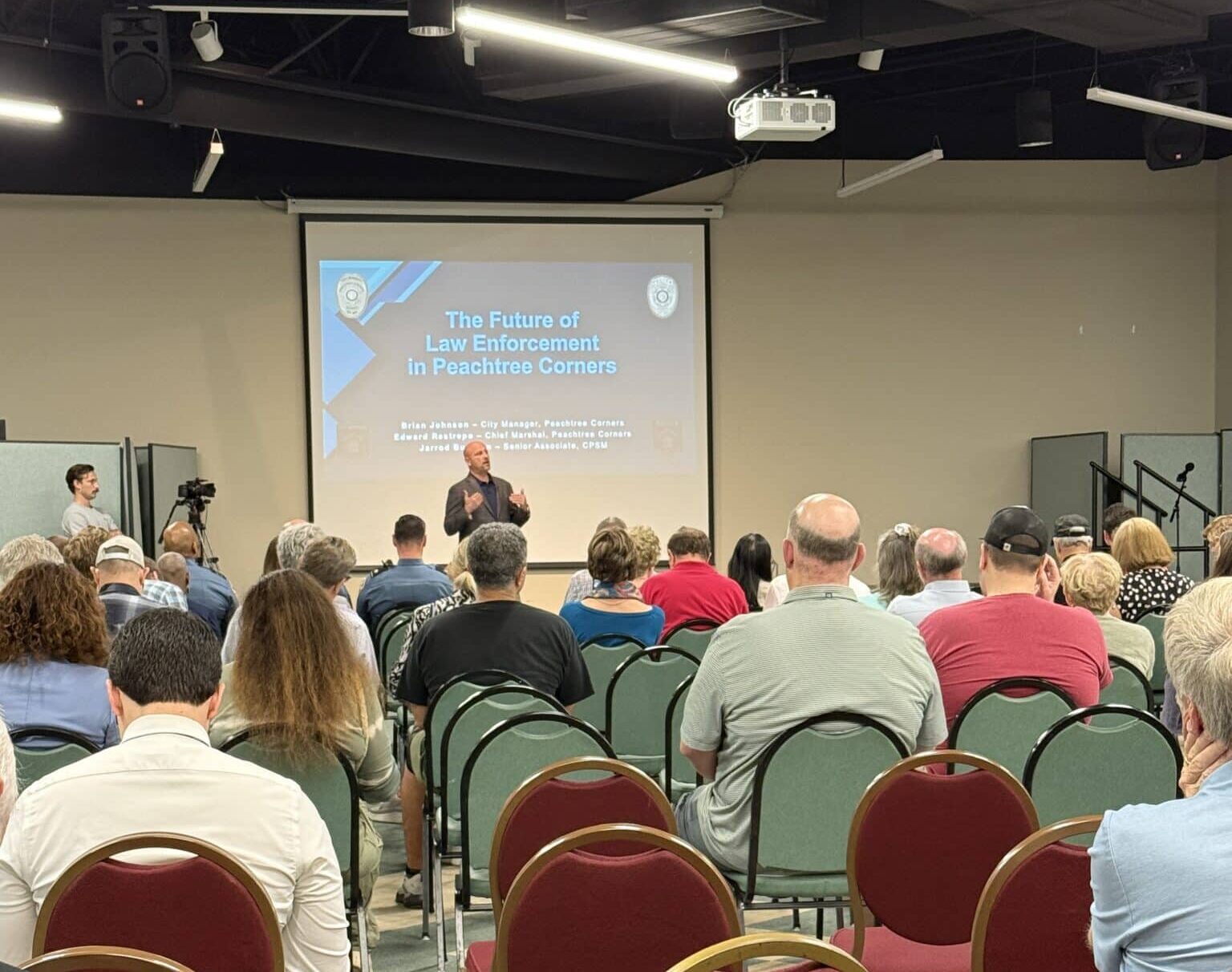
Although crime isn’t on the rise, and the Gwinnett County Police Department (GCPD) is fulfilling its role in fighting crime, the City of Peachtree Corners is asking residents, business owners and city stakeholders if they believe the city should form its own police department.
With over 100 people in attendance, City Manager Brian Johnson led the discussion about the future of policing in Peachtree Corners. He presented the findings from a survey conducted by the Center for Public Safety Management (CPSM), a nationally-recognized law enforcement consulting and training firm, as well as information about patrol officer staffing, response times, costs to tax payers and a potential timeline.
Ensuring public safety
Johnson kicked off his presentation by explaining that it is the duty of the mayor and city council to ensure public safety, including reviewing law enforcement.
“Maybe it needs to grow, maybe it needs to change its focus. But city council is the one that has the decision-making responsibility,” he said.
He was also adamant that this isn’t a done deal.

“I hit this point already, but I want to hit it again. This is the start of a conversation, a community conversation and feedback to council. There hasn’t been a decision,” he said. “Council has not received this presentation from me. They’re here to watch and learn from your feedback of this.”
Mayor Mike Mason was present at the meeting, along with all of the city council members except Eric Christ who was out of town and watching remotely.
Issues and obstacles
Johnson explained that the grounds for the inquiry were based on issues about communication, access to information and enforcement of city-specific ordinances. He cited an example where a city rule that private residences can’t be rented on a short-term basis like Vrbo or Airbnb wasn’t enforced by GCPD. An owner tried to circumvent the ordinance by only renting the outside of the house. A loud pool party ensued, and frustrated neighbors dialed 911.
“Officers showed up and they said, ‘We can’t enforce the city’s noise ordinance,’” Johnson said.
The first stage to fix this problem was creating the marshal program to bridge the gap between code enforcement and GCPD.
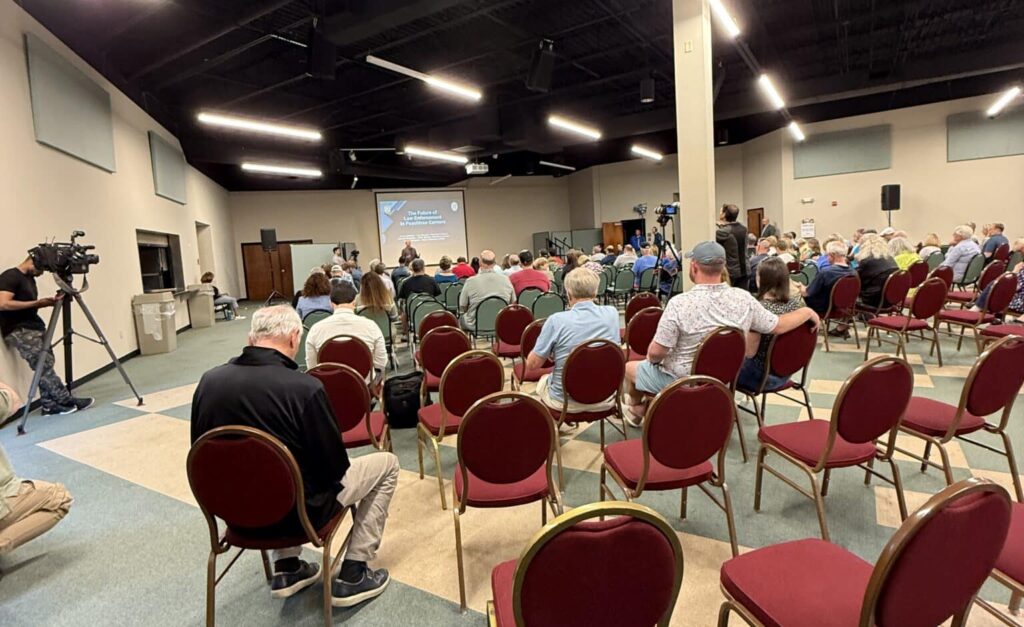
“[We thought] they would be able to enforce both local ordinance and state law, since they are a function of the city, and they could maybe be a force multiplier for Gwinnett since [marshals] don’t have to respond to 911 calls,” said Johnson.
But other issues arose shortly after the department was formed.
“We were still working towards getting that good balance, but we have been faced recently with a couple of things that make it harder for us,” said Johnson.
Seeking shared access
Instead of GCPD giving PTC marshals read-only, quick access to incident reports, dispatch calls and other information, the marshals department was required to file open records requests through the same process as any civilian.
“They were denied, as well as the city of Sugar Hill, [when] asked for the ability to see, not change, but see the computer-aided dispatch information, so that they would know where Gwinnett County police officers were; so that they could avoid stepping on their toes or maybe looking to support their efforts, and they haven’t been granted that,” said Johnson.
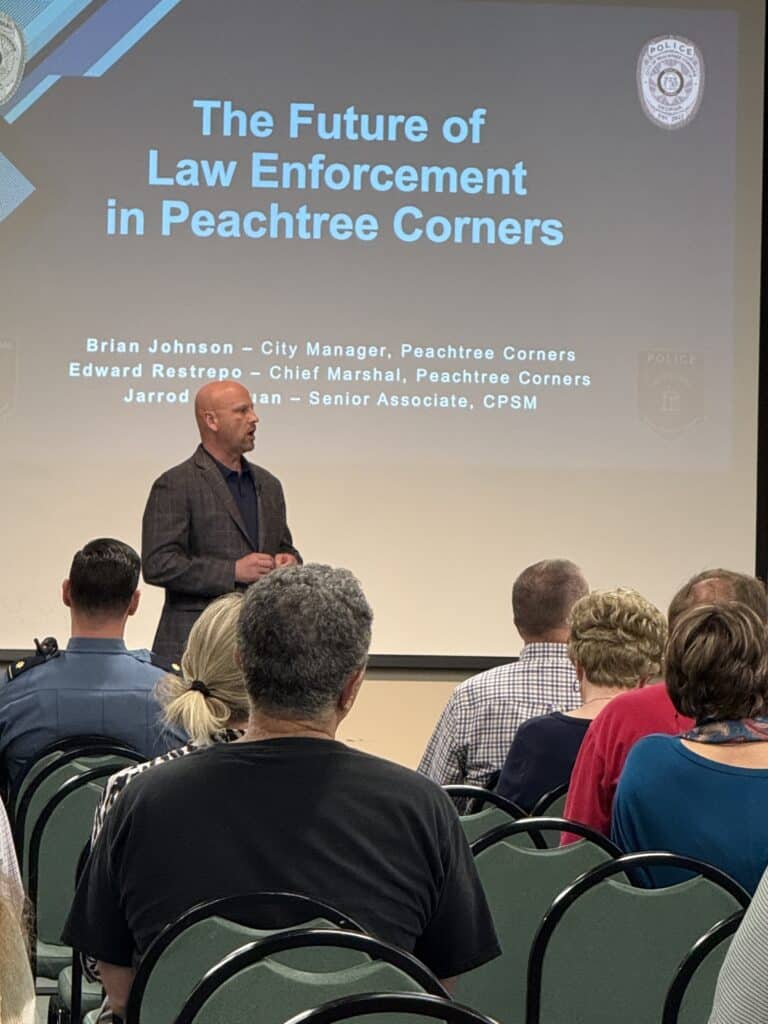
He added that the GCPD has video cameras on certain roadways that are used for various reasons, and law enforcement can use them when there’s crime in the area. Peachtree Corners marshals were denied access to those cameras.
“Conversely, we have a couple hundred cameras in the city, and we definitely want them to have access to them,” said Johnson. “So the frustration out of not being able to get that symbiosis between the marshals and police made us start thinking, all right, you know, is there another option?”
Community feedback
CPSM utilized data from GCPD to discern if Peachtree Corners could feasibly stand its own force. It also took into consideration crime trends, costs and many other factors. It recommended a 55-officer department, costing $12.1 million annually, with a $2.2 million upfront cost.
Comparing the two options to “renting vs. owning” the primary law enforcement agency in the city, Johnson presented pros and cons for each. Once the question-and-answer portion began, there was no obvious choice. Men and women, young and more advanced in age, had both similar and differing opinions.
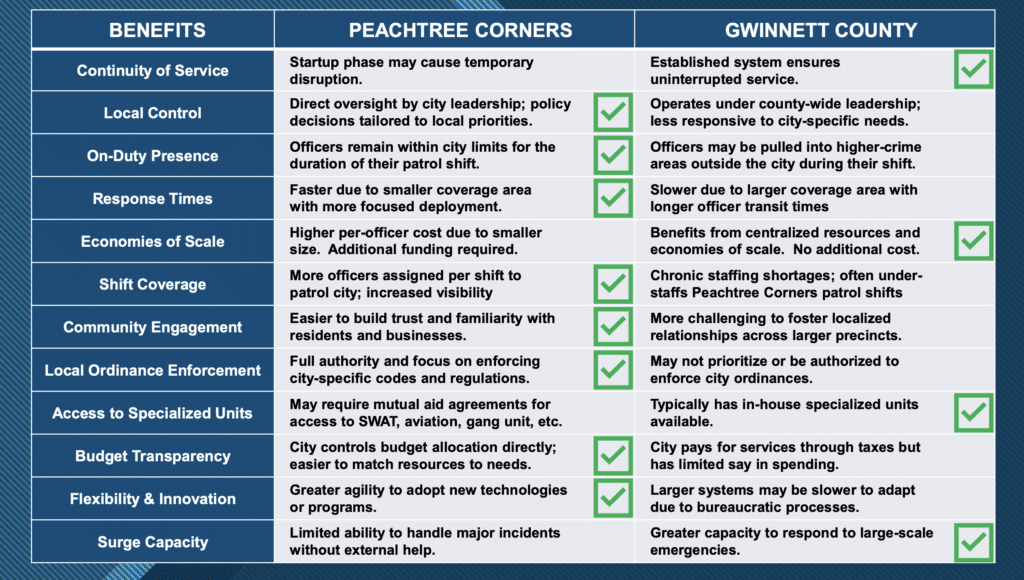
One young man, who identified himself as a local small business owner named Alexander, argued that with artificial intelligence increasing the efficiency of administrative tasks, perhaps the city wouldn’t need a full 68-man department of civilians and sworn officers.
Some accused the city of devising a solution in need of a problem. Others were concerned that paying approximately $100,00 for a study was throwing good money after bad.
But at the end of it all, the city is continuing to seek feedback and is encouraging everyone to make informed decisions. The meeting was taped and is available on the city website along with Johnson’s PowerPoint presentation, a copy of the study done by CPSM and a survey.
As far as a timeline goes, city officials would like folks to take the summer to mull it over and come back in the fall to take another look at the proposal.
Related
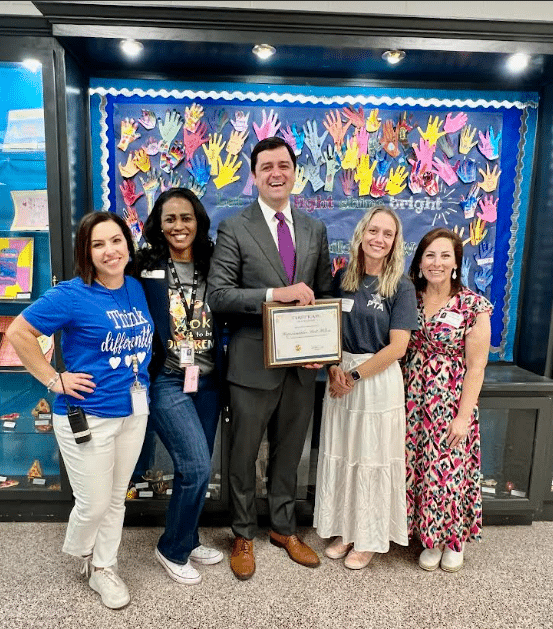
Simpson Elementary School celebrated Exceptional Children’s Week (ECW) last month with five days of special activities to recognize their special needs population and all of their exceptional students.
April 14–18 is set aside each year to celebrate children with disabilities, gifts and talents. This year’s ECW theme was Bridging Gaps and Building Futures, and the school was happy to take part.

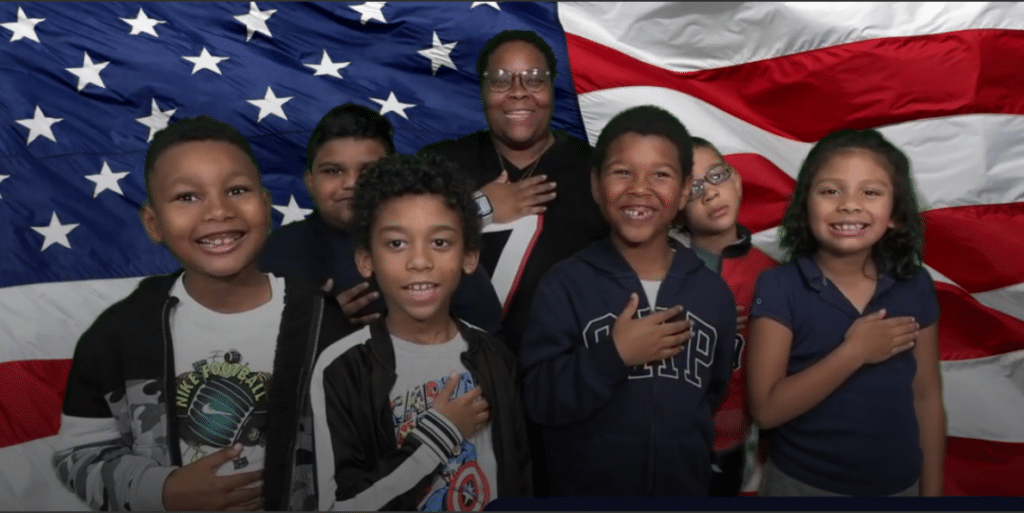
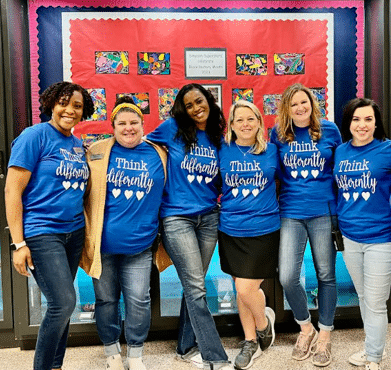
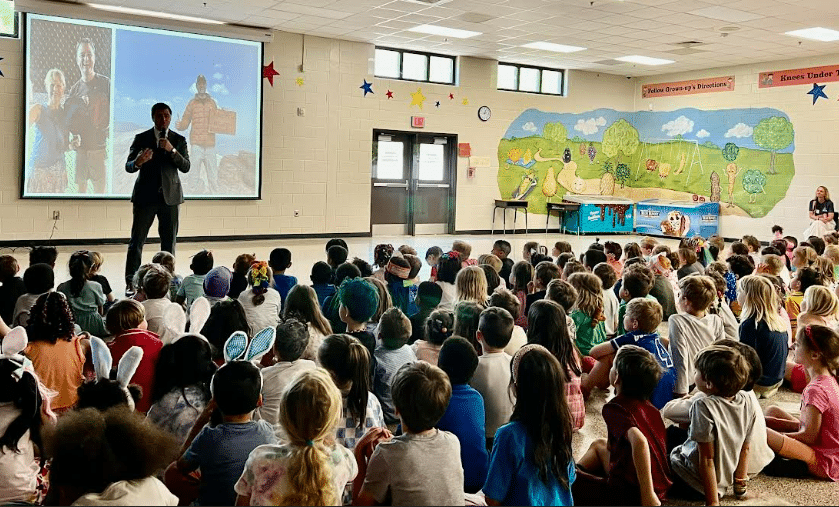
They highlighted each day of the week on the morning news with fun facts about notable people in society — and throughout history — who have overcome challenges with their disabilities, including actor Daniel Radcliffe (who has lived with dyspraxia for his entire life), Tom Cruise, Whoopi Goldberg, Frida Kahlo and Helen Keller.
Simpson Elementary’s technology team also pre-recorded various special needs classes reciting the Pledge of Allegiance every day of the week.
Guest speaker
To end their ECW with a bang, they invited former Simpson Elementary parent, State Representative Scott Hilton, to come in and speak to their K-2 classes about raising his son, Chase (who is autistic and now a student at Norcross High School), and how being different is okay.
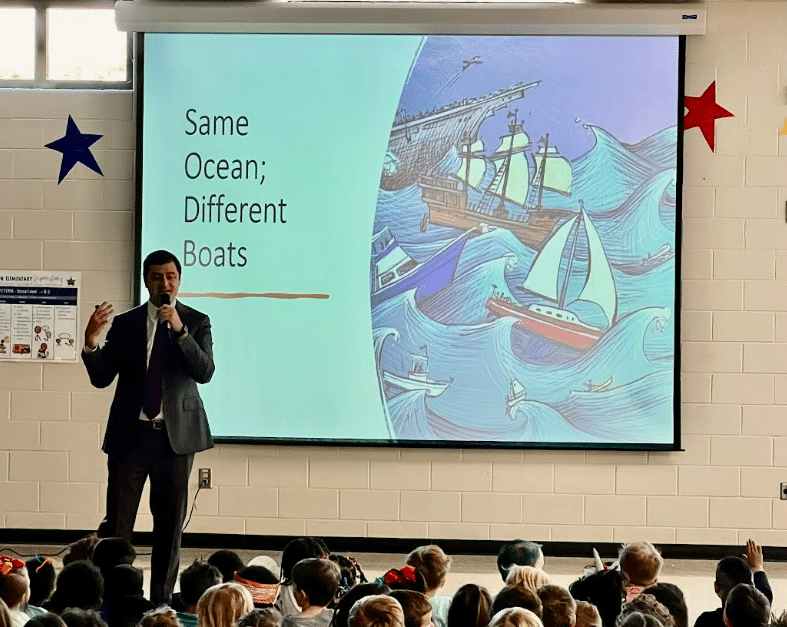
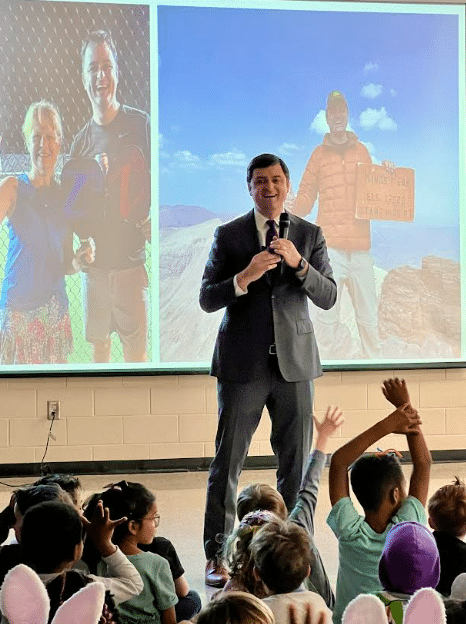
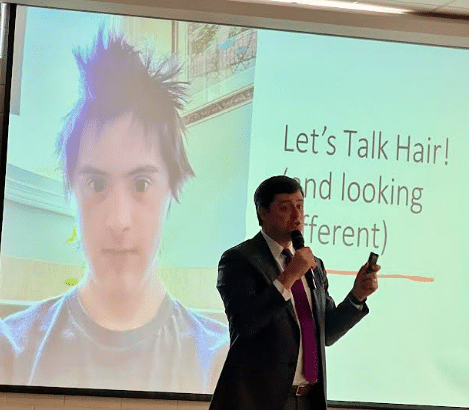
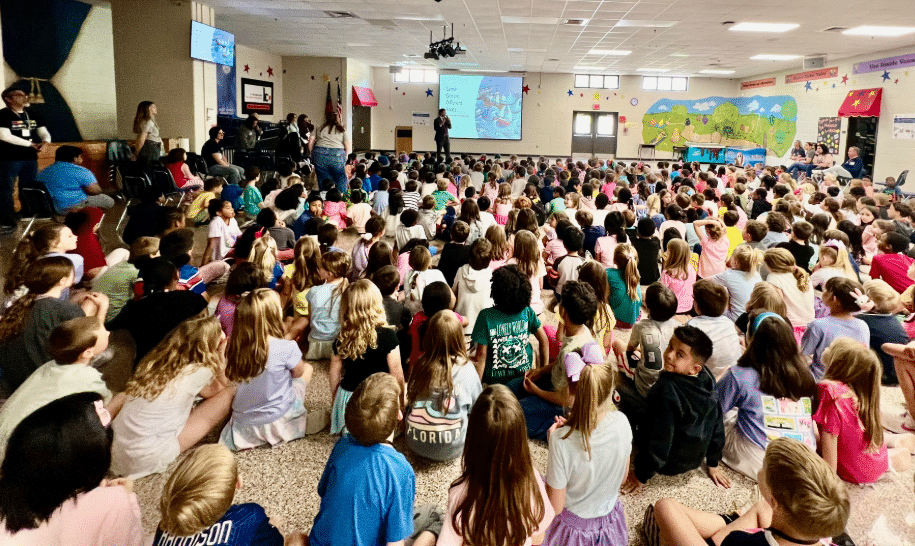
“Showing kindness and being inclusive is the best version of humanity,” said Dr. Taffeta Connery, Simpson Elementary School principal, in a statement about the event.
“Simpson Elementary has a special needs population of 214 (23%) of 946 students. [And] … we strive to ensure that our students are valued, recognized and instilled with high expectations for all.”
For more about Simpson Elementary, visit simpsones.gcpsk12.org.
Related
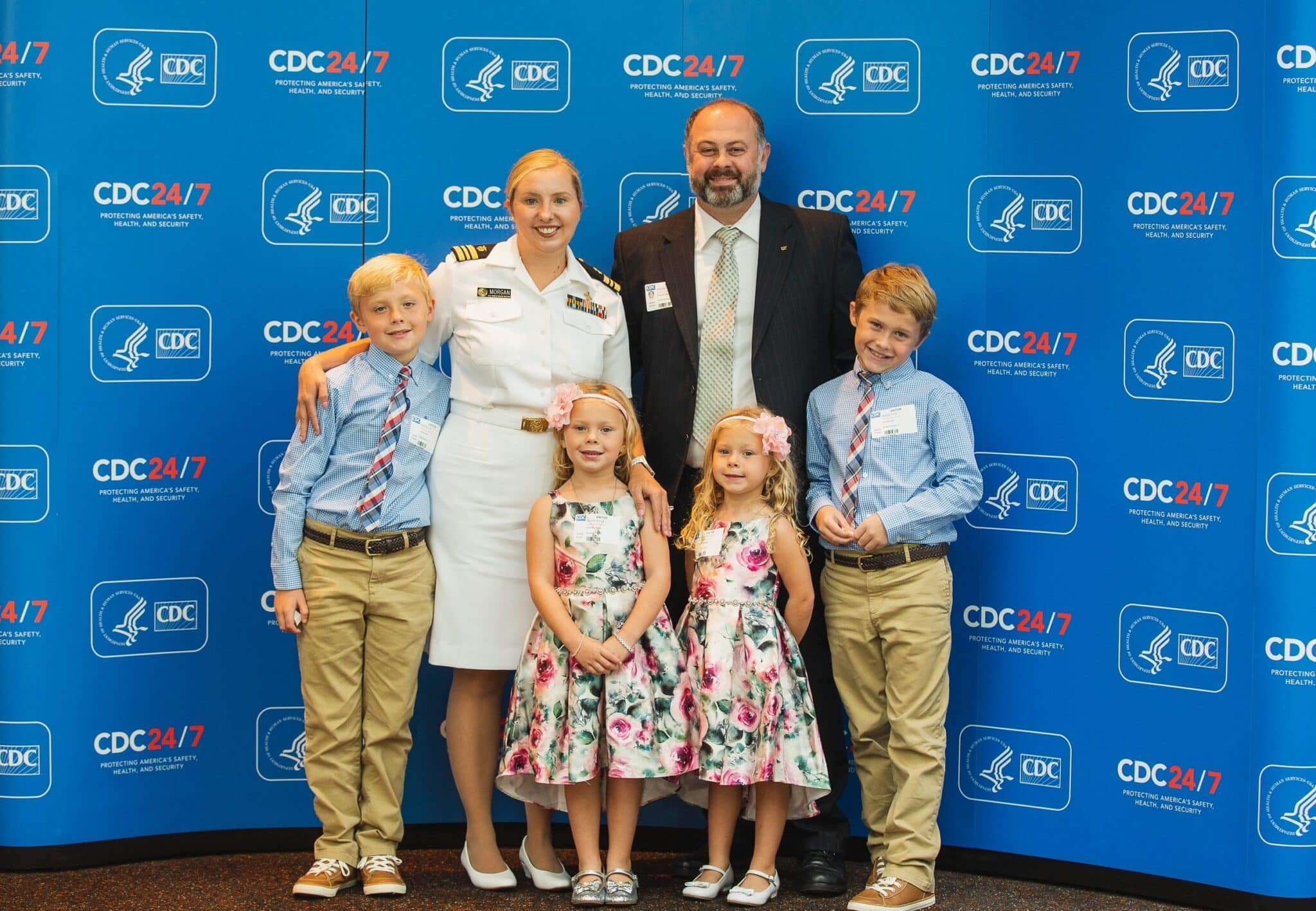
Motherhood comes with a lot of moving parts. For these Peachtree Corners moms, it also means leading teams, building careers and keeping the family schedule running. Most days, all at once.
This Mother’s Day, we’re spotlighting seven women in our community who are doing just that. They’re professionals in full-time leadership roles, showing up to strategy meetings by day and soccer games by night. They’re problem-solvers, planners, caregivers and coaches.
What connects them most isn’t just what they do, it’s how they do it. With intention. With humor. With support from partners, parents, friends and neighbors. And with a deep appreciation for the community they’ve built in Peachtree Corners.
Through their stories, we celebrate more than titles and to-do lists. We honor the quiet, constant work of showing up.
Tracy Lee
Tracy Lee leads with heart and vision as CEO of This Dot Labs, a software consultancy focused on helping businesses solve complex challenges through technology. Her engineering leaders collaborate with major clients like Stripe, DocuSign, Google, Wikipedia and Roblox. She’s passionate about her work.
“I love the mix of problem-solving and people leadership and knowing the work we do can make a real-world impact,” she said.
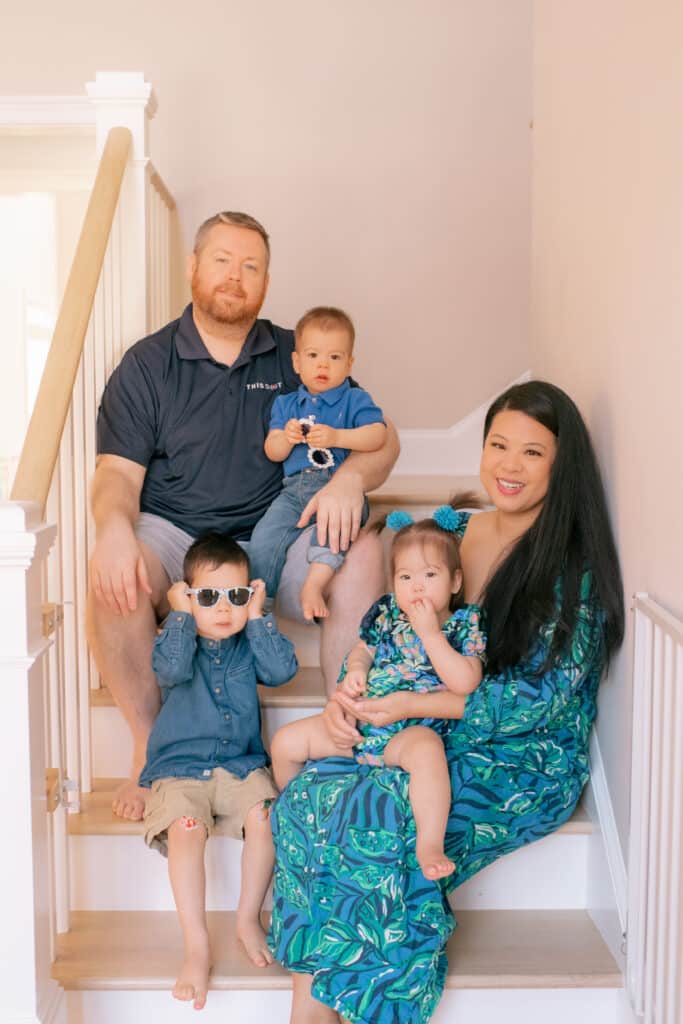
Tracy brings that same intentionality to her life at home, where she and her husband, Elliott Fouts, are raising three young children: William, 3, and twins Angelina and Marcus, who are 1.5. Despite the busy pace, Tracy is committed to being present in every role she plays.
“I have three full-time nannies and two part-time nannies, as well as girls around the neighborhood who are mama’s helpers to manage the chaos! With the help, we are able to do more and enjoy more time with our kids,” she said. “I try to be fully present, whether I’m in a meeting or building block towers in the living room. It’s never perfect, but we focus on what matters most in the moment.”
Tracy credits her support system for making it all possible. “I have an incredible partner and a strong support system between our nannies, friends and local community,” she said. “We have a local moms group for Asian moms called Georgia Asian Moms, and there are so many moms just in our neighborhood. It’s really great.”
Peachtree Corners has become a meaningful home base for the family. “We absolutely love it here,” she said. “There’s amazing programming for kids at The Forum every Tuesday in the spring and summer. It’s such a gem for young families.”
Weekends often include time outside and community adventures. “Sometimes the best hack is just piling everyone in the wagon and heading out for fresh air!” she said.
Tracy leans on a strong partner, a tight-knit group of friends and a local moms network. “It really takes a village,” she shared. “And I feel lucky to have one.”
Melissa Nicholson
Melissa Nicholson knows what it means to lead with heart and precision. As division vice president of program management & international solutions at Aya Healthcare, she helps internationally educated healthcare professionals enter the U.S. workforce.
“What I enjoy most is the opportunity to support these professionals in achieving their American dream,” she said. “While also contributing to improved patient outcomes across the country.”
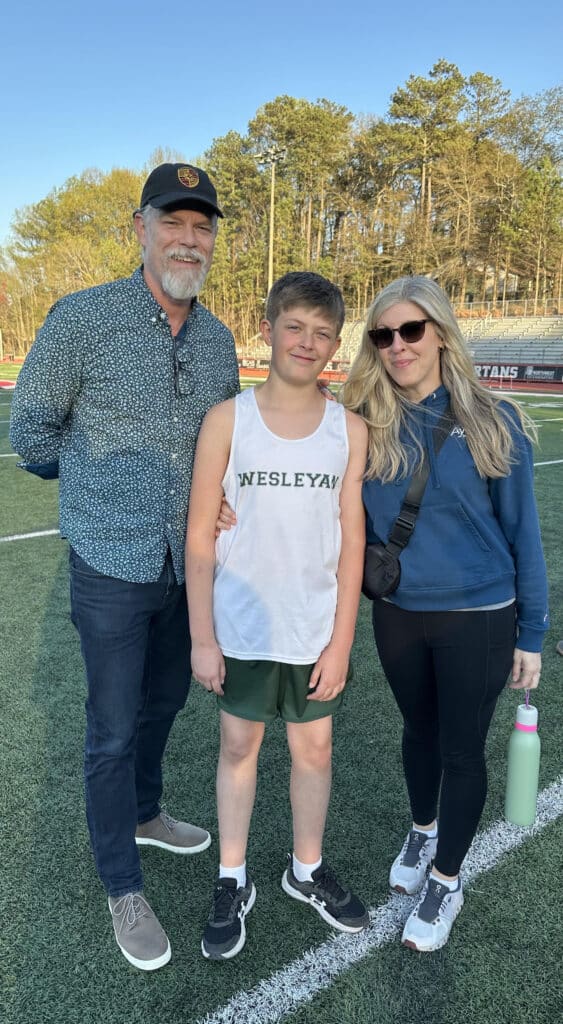
Melissa and her husband Greg recently celebrated 15 years of marriage. Their 12-year-old son, Luke, and a cat named Charlie bring a fun, loving dynamic of their own into the family. After relocating from East Atlanta a decade ago, they quickly embraced the Peachtree Corners community.
“It’s the people who make this community so special,” she said. “We’re truly grateful to count our neighbors as friends.”
Balancing an executive role with family life takes clarity and commitment. “I have to be very intentional with my time,” Melissa shared. She sets boundaries at work and makes sure her team knows when she’s off the clock for important family moments.
Wellness is a key part of her rhythm. “I recently started working out at Orangetheory Fitness,” she said. “I’ve noticed a significant boost in both energy and focus.” Sundays are for church and reflection.
When she travels for work, Greg holds it down at home. “We rely on each other to keep life running smoothly,” she said. “I’m grateful every day for that kind of partnership.”
On weekends, Melissa prioritizes quality time. Whether that’s a hike, pool day or baking something from scratch. “We’ve learned that if we don’t prioritize those moments, the weekends can quickly get taken over.”
Diva Hicks
For Diva Hicks, work isn’t just a job, it’s personal. As creative senior manager at CURE Childhood Cancer, her mission runs deep.
“At 12 years old, my sister was diagnosed with cancer,” she said. “CURE, in its early days, was a resource for my family.”

Her sister survived and now thrives. That experience shaped Diva’s career and continues to inspire her today. “This is my opportunity to give back to CURE for what it did for my family,” she said. “It’s rare to find a place where your purpose and passions collide.”
CURE also welcomes her whole family into the fold. “I get to bring my kids to events all the time,” she said. “They love feeling like they are a part of my work.”
Diva lives in Peachtree Corners with her husband John, their children Adair, 8, and Tripp, 6, and two golden doodles. “There is a sense of community here that I think is special,” she said.
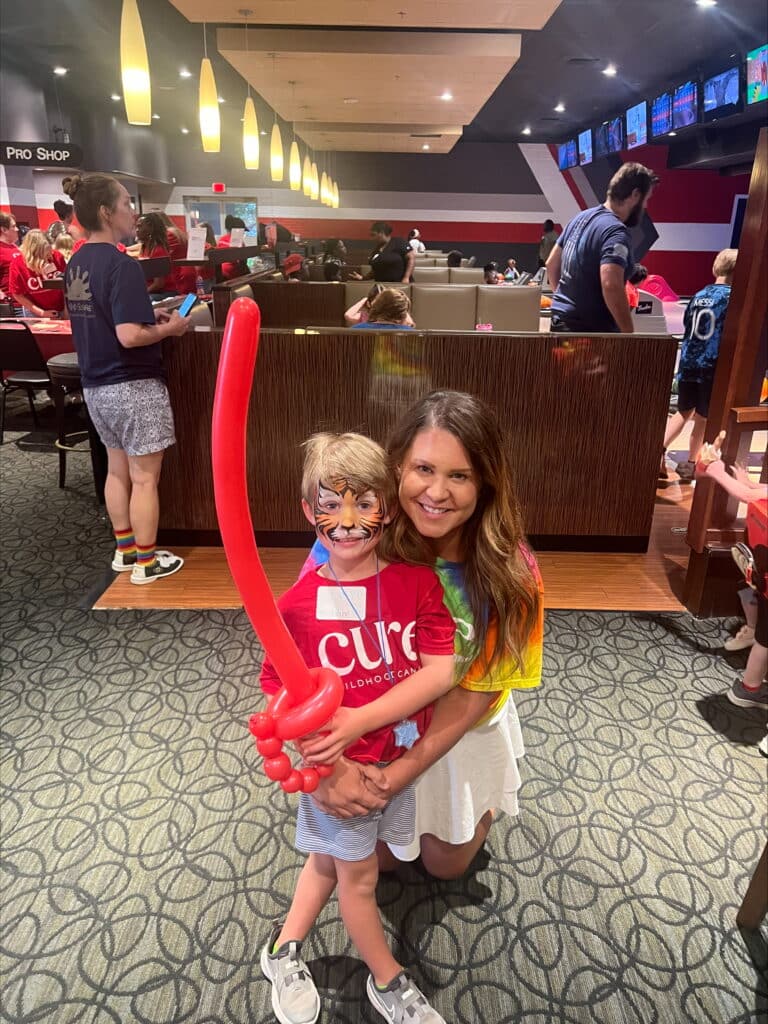
Balance is a daily effort. “John and I have tackled who helps with homework and on what days,” she said. “I would not be able to be the mom that I am without my village.”
She leads school committees and never misses events. “Is it easy? No,” she said. “But I honestly say, it’s not easy for any parent.”
Diva’s motivation is clear. “I want Adair to look at me and see that she can be a mom and have a career too.”
The family stays grounded with tennis weekends and careful planning. “We live by our calendar,” she said. “The more prepared I am, the easier life is.”
Kate Martin
Kate Martin knows how to bring structure to busy systems. As senior director of financial planning and analysis at Alloy Roofing, she finds energy in collaboration and clear strategy.
“In this role, I work closely with various teams across the business,” she said. “It supports the company’s strategy and performance.”
Kate and her husband, Nathan, are raising two children, 14-year-old Elliot and 10-year-old Evan, in Peachtree Corners. After ten years in the area, she credits the people for making it feel like home. “Life wouldn’t be the same without the relationships we’ve built here,” she said.
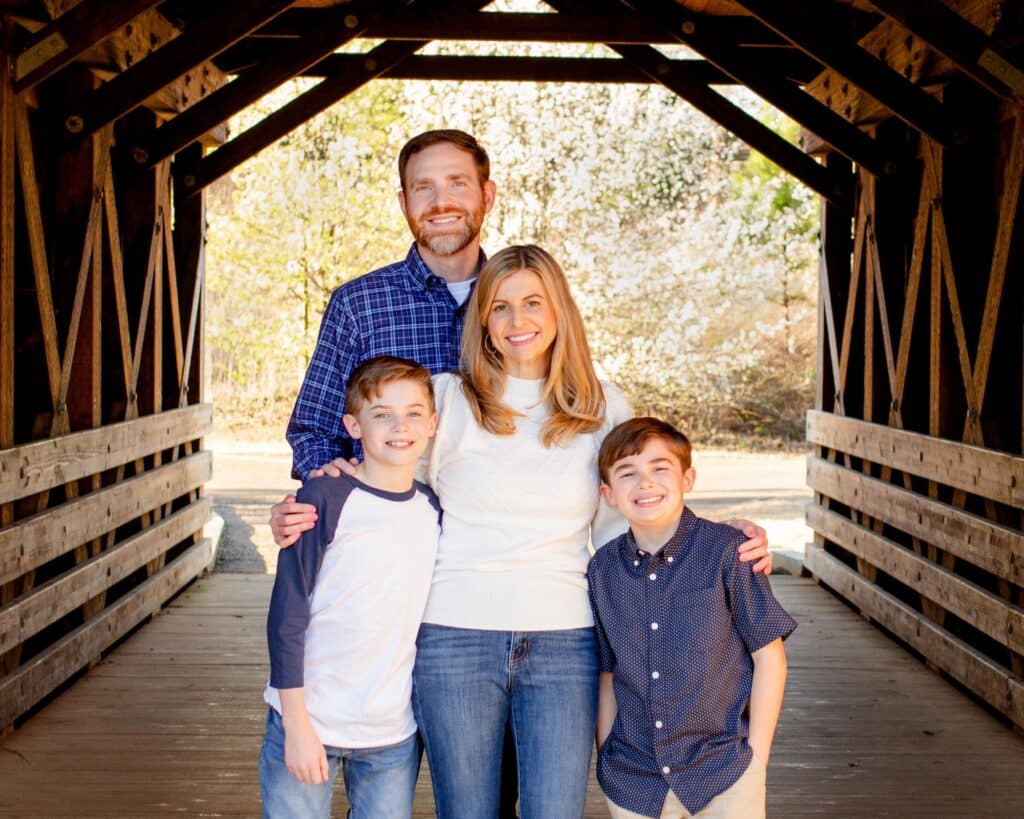
Balance starts with planning. “We keep a central Google calendar synced with all the family commitments that we review daily,” she said. “On Sundays we write on the kitchen boards.” Their chalkboard becomes the weekly roadmap, from meals to responsibilities.
“Seeing things laid out visually keeps me from overcommitting,” she added.
The family stays grounded by recognizing progress. “What keeps me motivated is celebrating both the big and small wins together,” she shared. “Sometimes, making it through the week is a victory in itself.”
Kate relies on a strong network. “We are very fortunate to have my parents nearby,” she said. “I also have an amazing network of women here in Peachtree Corners that I rely on.”
Her favorite hack? “An app Nathan created to help manage our calendars,” she said. “He created a solution to integrate these webcal subscriptions into a central subscription hub.” It’s called Skedj, and they’re piloting it now. “If you know this struggle and want to help us pilot the app, check out skedj.co!”
Linda Luna
As vice president at RSUI, Linda Luna manages risk while empowering people. She leads a team of underwriters who handle professional liability and cyber insurance. “I really enjoy my job because of its dynamic nature and the opportunity to help people in meaningful ways,” she said.
Whether she’s mentoring her team or protecting clients’ businesses, Linda finds value in impact. “It’s rewarding to know that my work has a positive impact on both my colleagues and our clients.”
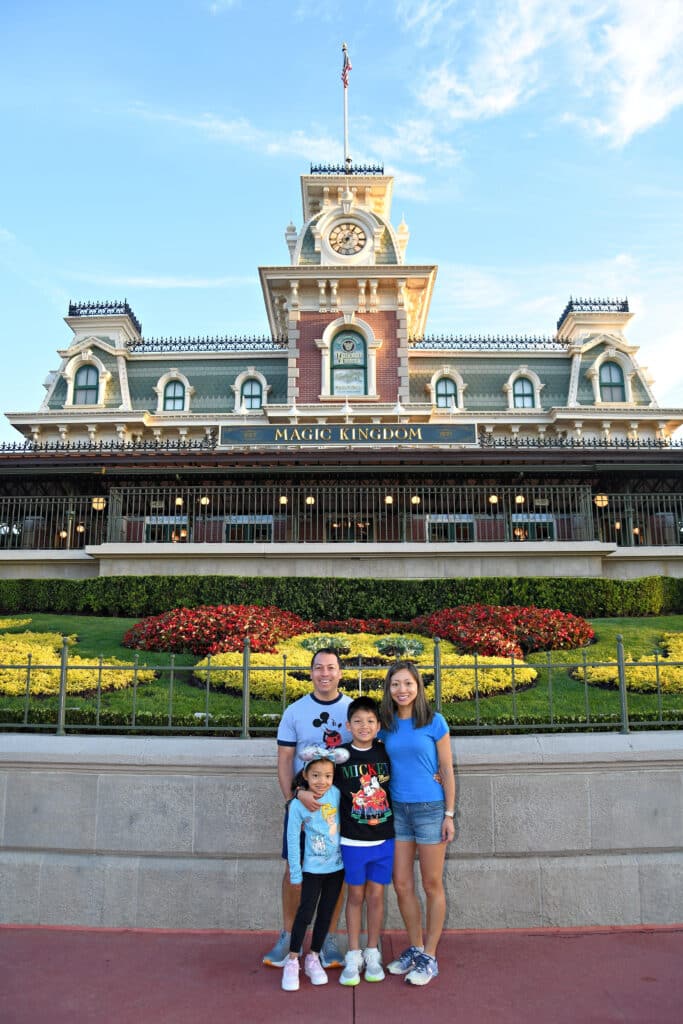
She and her husband, Ruben, are raising their two children, Dawson, 10, and Ava, 6, in Peachtree Corners. Her parents, though not under the same roof, are a constant part of daily life. “They help keep things running smoothly on the home front,” she said.
After nine years in the community, Linda has grown to love its blend of charm and convenience. “There is always something to do,” she said. “Whether it’s grabbing a bite at Ted’s or spending time with friends at Town Center.”
Balance comes from structure. “By establishing a solid schedule and sticking to it, I can ensure that my work commitments are met,” she said. “Being fully present allows me to strengthen my connection with my loved ones.”
When things get busy, she takes a practical approach. “Breaking it down into smaller, manageable tasks makes it much more approachable,” she said. “I remind myself to keep the bigger picture in mind and not sweat the small stuff.”
Linda’s support system is strong. “It truly takes a village, and I’m so grateful for mine,” she said. The family’s favorite tradition? A beach trip to 30A every May. “It’s our way of unwinding, reconnecting and making lasting memories together.”
Allison Blasetti
Allison Blasetti holds a national leadership role at Transamerica in the employee benefits division — a position that constantly challenges and motivates her. “What I enjoy most is the opportunity to use my talents to help my team,” she said. “I’m always growing and learning.”
She and her husband, John, are raising daughters Annie Mae, 8, and Olive, 6, in Peachtree Corners, where they’ve built strong ties in the community. “The amenities in our city provide many opportunities to run into friends around town or plan meet-ups,” she said.

Allison works from home and prioritizes clear boundaries. “I turn off my app notifications because it quickly pulls me back in to work,” she said. “I also have a dedicated workspace in my house where I can leave at the end of the workday.”
She’s developed the habit of resetting her mindset, as well. “I quickly recognize [when] I’m mentally ‘at work’ and actively redirect my thoughts back to being in the present moment.”
Allison’s mornings begin at Burn Bootcamp, where she finds motivation and connection. “Spending an hour with my Burn community helps me get grounded for the day,” she said.
To stay organized, she and her husband use a shared family calendar. Her mom steps in often, especially when work travel ramps up. “I really don’t know what we would do without her.”
On weekends, Allison coaches Olive’s soccer team with the Peachtree Corners Football Club. “It brings me so much joy to be outside, see my soccer friends and watch my girls have fun,” she said. “Coaching makes it even better because I get to support the community that means a lot to me.”
Samantha Morgan
Samantha Morgan is a commander in the U.S. Public Health Service, currently assigned to the Centers for Disease Control and Prevention. Over her career, she’s responded to major public health threats, including Ebola, Zika and COVID-19. Today, her work centers on injury prevention, with a focus on issues like suicide, drowning and traumatic brain injury.
“What I enjoy most is being part of CDC’s mission to save lives and protect people,” she said. “I’m proud to contribute to work that makes a tangible difference in communities across the country.”
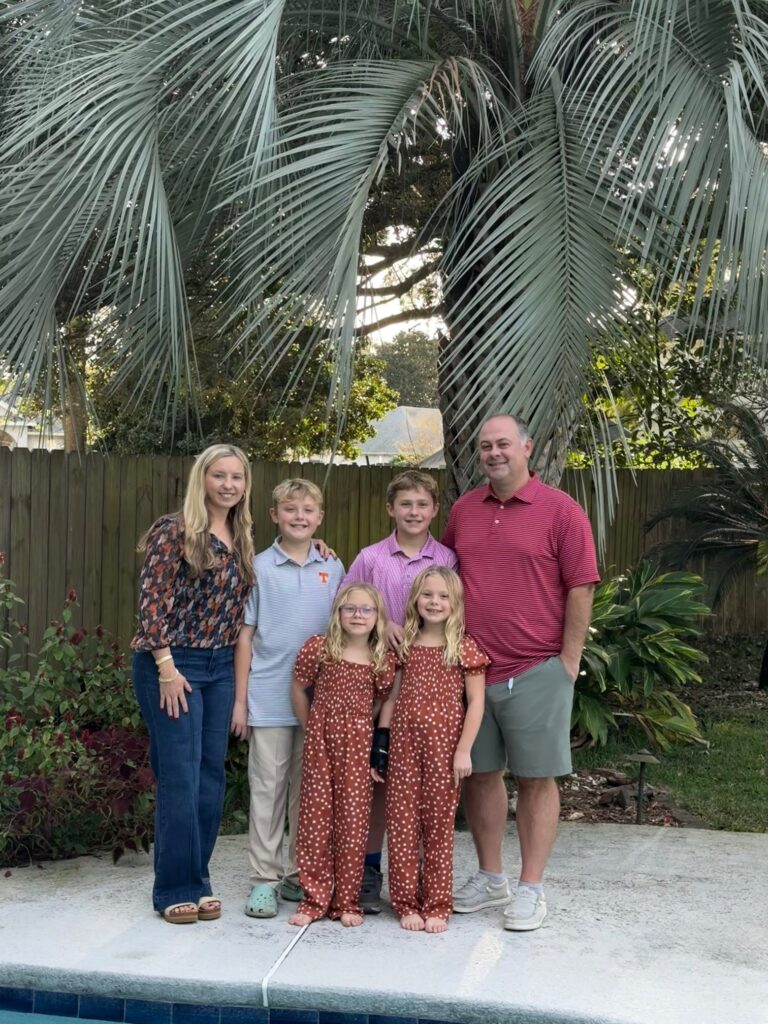
At home in Peachtree Corners, Samantha and her husband, Brian, are raising two sets of twins. Luke and Elliot are 12-years-old and love baseball, golf, basketball and band. Charlotte and Noelle are 8-years-old and enjoy piano, tumbling and tennis. “Life with four kids is wonderfully busy,” she said. “I often joke that I’m an unpaid Uber driver!”
After more than a decade in the neighborhood, Samantha credits their support system for helping them manage the day-to-day. “Our neighbors and friends — our village — have supported us through the hardest moments and celebrated life’s greatest joys with us,” she said.
Structure is key to keeping things on track. “We live and breathe by our family calendar,” she said. “Shared schedules, group texts and carpooling help us keep things running.”
Her children remain Samantha’s biggest motivators. “They know, ‘mom’s going to work to help make the world a safer place,’” she said.
The family also leans on routines and simple joys. “Checklists are my go-to mom hack,” she shared. One of their favorite traditions is make-your-own-pizza night. “It’s messy, silly and something we all genuinely look forward to.”
The seven women featured here offer a glimpse into the lives of working moms in Peachtree Corners. Each one balances career, family and community with care and intention. They are just a few of the many women — both working and stay-at-home — who nurture, organize and uplift the people around them every day.
Whether leading teams or guiding their children, mothers across this community show up with strength, love and quiet determination.
You’ll find this story in the May/June issue of Peachtree Corners Magazine, available in print and digital edition.
Related
Read the Digital Edition
Subscribe
Keep Up With Peachtree Corners News
Join our mailing list to receive the latest news and updates from our team.
You have Successfully Subscribed!

Digital Edition

Official City Merchandise Line Debuts This Saturday at Town Green

Paul Duke STEM High School Student Earns CGO Scholarship

World Blood Donor Day Starts Here: Theo’s Miracle, Katherine’s Mission [Podcast]

Executive Function: A Tribute to Working Moms

Peachtree Corners Grows Business Opportunities Through Economic Development

Simpson Elementary Marks Exceptional Children’s Week

Peachtree Corners Hosts Discussion About the Future of Local Policing

Atlanta’s Dog Howl-O-Ween Festival Moving to Peachtree Corners for 2025

D1 Training Brings New Fitness Concept to Peachtree Corners

Peachtree Corners Hosts Discussion About the Future of Local Policing

City of Peachtree Corners Awarded Certificate of Achievement From GFOA for Seventh Straight Year

Simpson Elementary Marks Exceptional Children’s Week

Executive Function: A Tribute to Working Moms

Official City Merchandise Line Debuts This Saturday at Town Green

Peachtree Corners Grows Business Opportunities Through Economic Development

Light up the Corners [Video]

Capitalist Sage: Business Leadership in Your Community [Podcast]

Cliff Bramble: A Culinary Adventure through Italy

Top 10 Brunch Places in Gwinnett County

A Hunger for Hospitality

THE CORNERS EPISODE 3 – BLAXICAN PART 1

Top 10 Indoor Things To Do This Winter

The ED Hour: What it takes to Remove Barriers from Education






